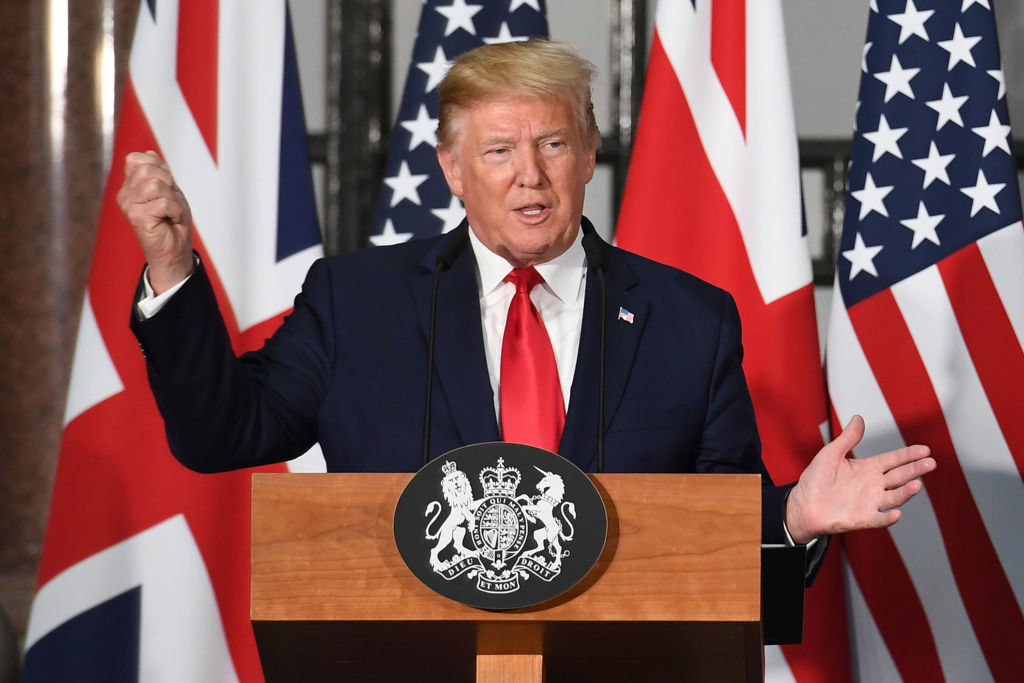Back in July 2019, Donald Trump called Boris Johnson ‘Britain Trump’, before adding ‘that’s probably a good thing, they like me over there’. Awkwardly for Johnson at the time, this was certainly not the case for the majority of Brits, even among those who backed Boris. In 2019, 7 in 10 thought Donald Trump had been a bad president, including a majority of Conservative voters.
While Johnson might have squirmed at Trump’s endorsement back then, politicians in the UK today seem to be rushing to ingratiate themselves with the new administration. And it’s not just politicians changing their minds, British voters are also warming to Trump 2.0.
New data from my company JL Partners shows that the British public, only 8 per cent of whom said Trump had been a good president on leaving office, are more likely to say they view him more positively after the last few weeks than negatively. And whilst he is still by no means hugely liked, 4 in 10 Reform UK voters, 1 in 3 Conservatives voters and even 1 in 5 Labour voters say their views of Donald Trump have become more positive since the inauguration.
So what has changed? The shift is partly driven by what Trump says he will do. After his victory in November, Labour said they would learn from the Democrats’ mistake and focus on immigration and the economy. And indeed, there is now net support among the British public for much of what might be termed a Trump-style policy platform, including ‘declaring a national emergency at the channel and carrying out deportations of those living here illegally’, ‘completely changing direction from a previous government’, and interestingly given the last 48 hours, ‘increasing tariffs, cutting foreign aid and suspending visas for countries who refuse to accept deportation flights carrying their citizens.’
But there is more to it than that. British voters gave the Conservatives such a drubbing at the ballot box in July last year because they were frustrated at what they saw as 14 years of stasis and inaction. One thing we regularly heard in focus groups from voters of all stripes was that they were desperate for change, for politicians to finally stop talking about what they were going to do and actually do it. Keir Starmer’s personal ratings have in turn suffered from a pervading sense that he does not move decisively, and that he lacks the drive to execute his vision, if he has any vision at all. It is this element of Trump’s brand that voters are looking for someone to emulate in the UK.
Who might harness the political appetite for elements of a ‘Britain Trump’ in 2025?
A majority of Brits, including those that don’t like him or his ideas, say that ‘regardless of Donald Trump’s politics he is able to get things done,’ and there is similar agreement for the statement ‘it’s a breath of fresh air when a politician makes a change, regardless of if I agree with that change’. Crucially, they also agree that ‘Keir Starmer and Labour can learn from Trump’s urgency and determination to get things done.’
Perhaps it is not a surprise that Reform voters are the most likely to feel positively towards Donald Trump, but strikingly, this enthusiasm is now also seen in parts of the electorate that have been firmly in Labour’s corner in recent years. Young people and those from black, Asian and ethnic minority backgrounds are now more likely than not to say that they are ‘excited by what Donald Trump can do over the next 4 years’ and they particularly strongly agree that ‘it is a good thing for the US that Donald Trump is focused on getting things done.’
So which British political party will capitalise on this strong desire for action from voters? Who might harness the political appetite for elements of a ‘Britain Trump’ in 2025? Our last word cloud asking who would make the best Prime Minister showed ‘Nigel Farage’ feature most prominently, a marked change on this time last year when Keir Starmer dominated. Indeed, Reform UK continues to take advantage of the public’s current frustration with traditional Westminster politics and has been steadily increasing their performance in the polls since July. If Labour and the Conservatives want to reassert their traditional dominance they could do worse than to look across the Atlantic and try to demonstrate that they too can get something, anything, done.






Comments